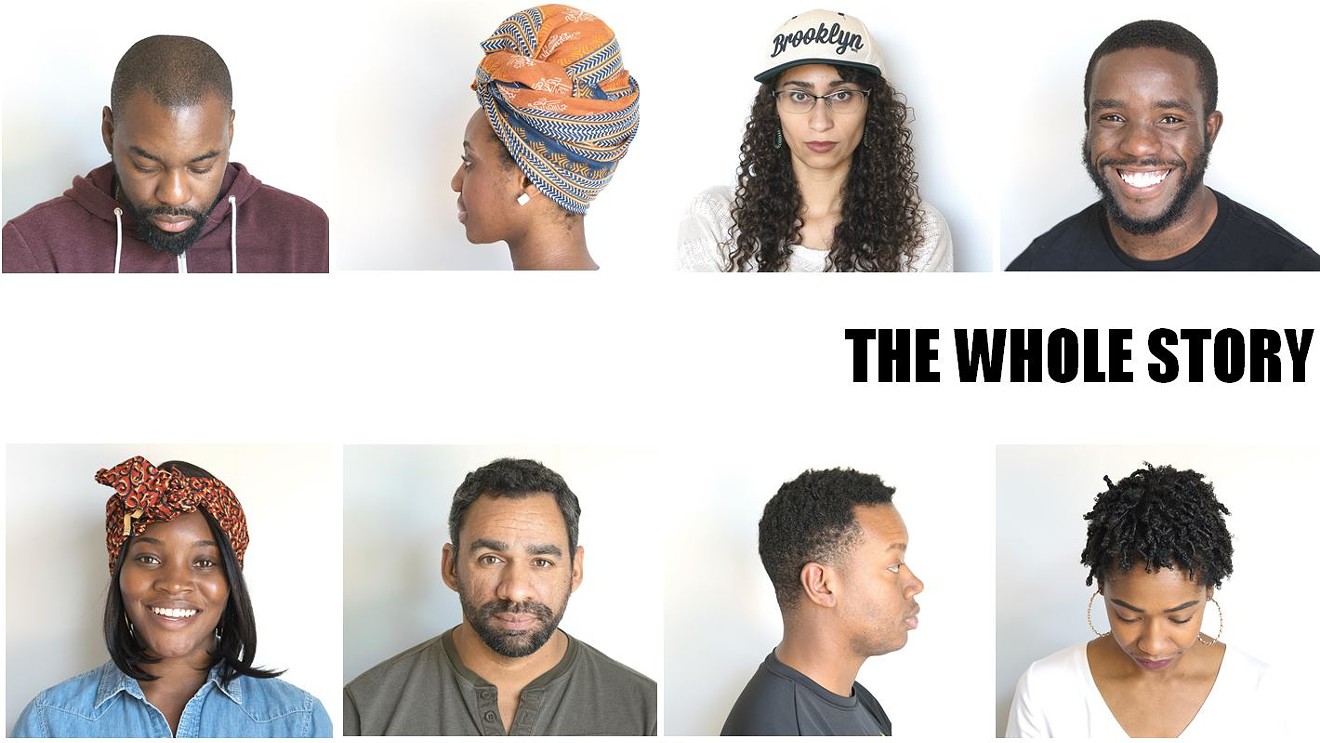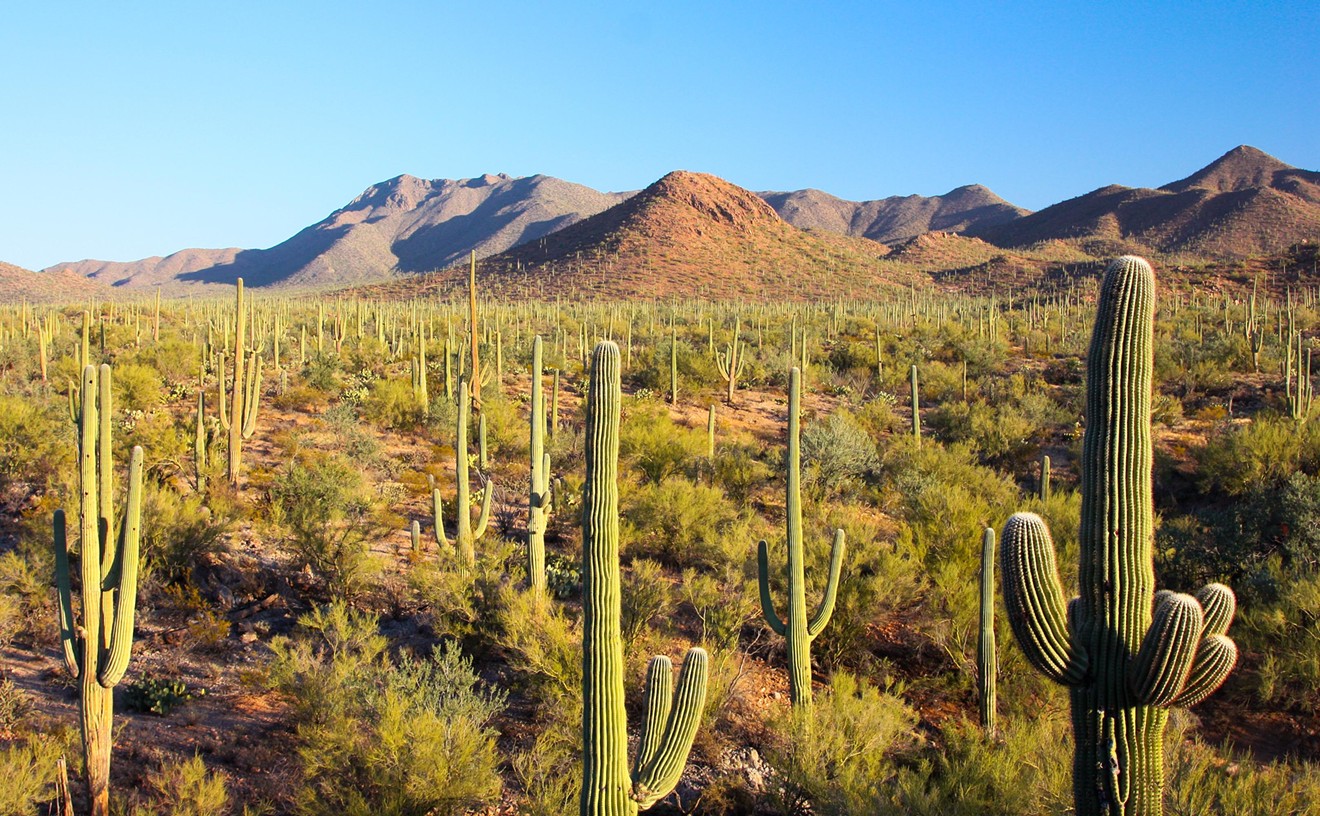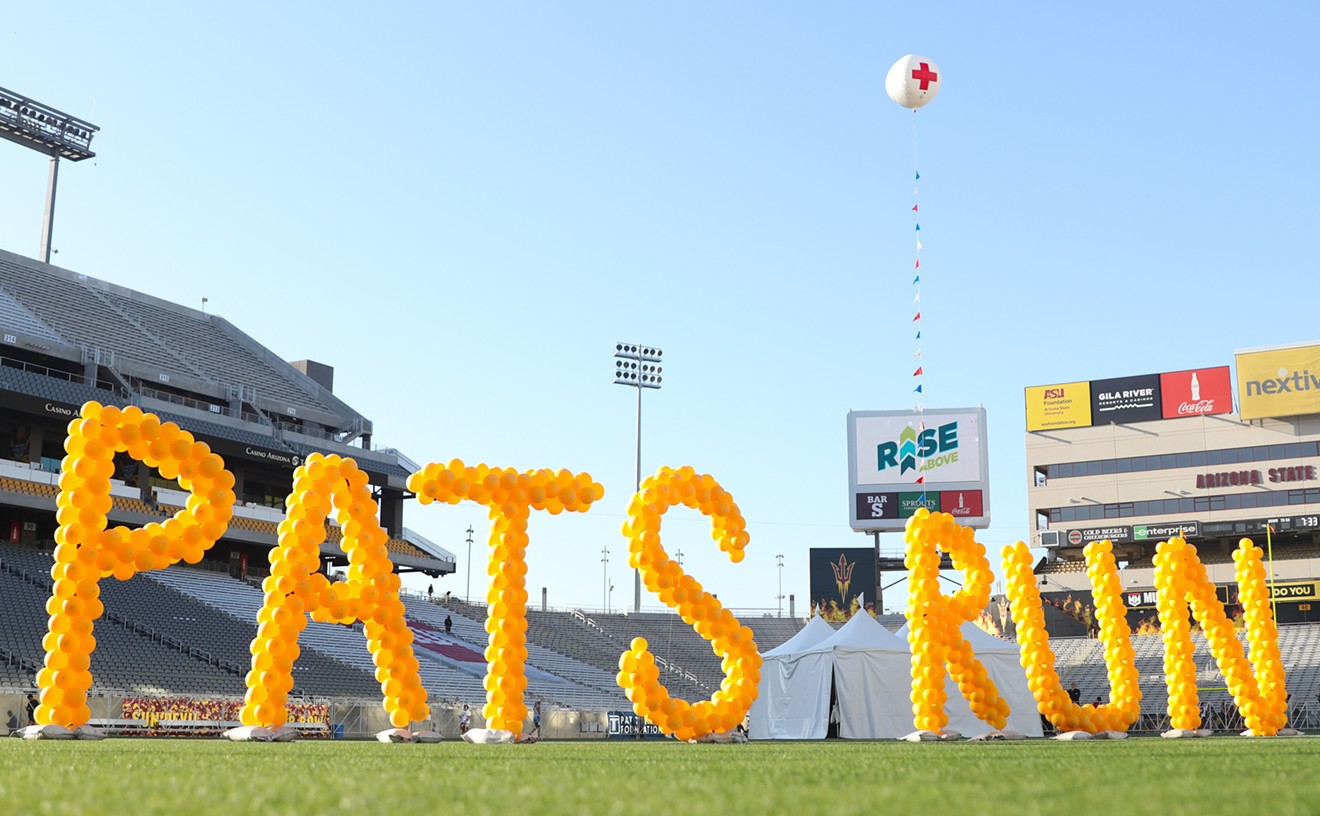Rachel Egboro is no stranger to the stage.
The 30-year-old storyteller and co-producer of the bimonthly event, the Storyline, read a piece about her relationship with music and church at New Times’ Bar Flies “Smells Like Teen Spirit." She’s shared personal feelings of pride, like when she told a story about how her father’s journey from being an orphan in Nigeria inspired her at The Arizona Republic’s Arizona Storytellers “Family”-themed event. Usually, she is the only black person on stage.
That’s about to change.
On Friday, January 6, Egboro will take the stage along four other black storytellers when she debuts a new project, The Whole Story, an exercise in sharing the broader black experience with a wide audience.
“I was thinking about what I could do as a black person, as a storyteller, how could I contribute to this conversation?” Egboro says, referencing a conversation spurred on by hashtags and protests, deaths and police violence, but also by lack of dialogue and racial understanding. “There’s different versions of what happens in those situations, and giving others a chance to hear from these voices and hear aspects of life that are just life, not just about being black but also about being a mother, father, sister, [or] daughter.”
In short, it’s about “creating a space for the whole story to be told.”
Starting at 7:30 p.m. at Phoenix Art Museum, five black men and women will share a moment, a memory shaped by their skin tone, but not defined by it. They will be stories they have all told before in a distinctly different setting. Each has experience behind the mic, and each knows what it's like to be the only black performer in an event lineup.
Some, like stand-up comedian Anwar Newton, have read at the monthly Bar Flies event at Valley Bar. Others, like Storytellers Brand Project associate producer Alexus Rhone, have spoken at Arizona Storytellers events across the Valley. Some are regular performers with the Storyline, which Egboro co-produces with Dan Hull at the Newton in midtown. Both Evan Roberts and Melissa Dunmore have told at all three. Arguably, these are the best-known storytelling events in the city.
Altogether, 40 public, ticketed events were held last year by New Times’ Bar Flies, organized by managing editor Amy Silverman and co-curated by contributor Katie Johnson; The Arizona Republic’s Arizona Storytellers, founded by Megan Finnerty, former Republic reporter and current director of the Storytellers Brand Studio; and the Storyline, a co-production from Egboro and Hull.
Over the course of 13 events in 2016, Bar Flies featured a total of 65 readers, with about five readers per event. Three — Egboro, Newton, and Ada Martin — were black. Arizona Storytellers presented 131 tellers, averaging six performers a show. Of the more than 100 tellers across 21 nights, 17 were of African descent or African-American.
Meanwhile, the Storyline’s last two shows of the season featured four black performers out of a total of 13. Half the tellers of September’s show, “Me, My Selfie & I,” were black. The next show, “Grandparents,” on Friday, January 13, will include three black storytellers: Sylvia Torrey, Augustine Edosomwan, and Dunmore.
“Everyone wants diversity and we all are working toward it,” Egboro says, noting that “diversity” should include everything from age to sexual orientation to religious affiliation. “As a storytelling community, we all work together pretty closely, so I wouldn’t say that [Storyline's] more diverse than the others, it just happens that way.”
And indeed, while some nights lacked in diversity from a black standpoint, they brought identity to the stage in other ways.
Last March, Arizona Storytellers produced “Estamos Aqui,” which consultant Marilyn Omifunke Torres, who describes herself as Afro-Latina, says “focused on community over color, everything from Colombian to Puerto Rican to Argentinean.”
Bar Flies’ “Best of Phoenix” show last October primarily featured readers from the Latinx community in keeping with the issue’s "Bordertown” theme. And more than half of those on stage at every single show are women.
People of Mexican-American, Native American, and Asian-American descent have all stood behind the mic at any given event to tell true, personal stories. There was never a night devoted to straight, white, male tellers over 40 in 2016.
“Knowing that The Whole Story is intentionally all-black made me feel I had to be a part of it,” says Dunmore, who is Afro-Latina. Working with Mujeres de Sol, an all-female artist collective, has allowed her to share the stage with women of color at performances at the Heard Museum and Herberger Theatre.
“Outside of my work with Mujeres del Sol, there have absolutely been times when I’ve been the only woman, the only black storyteller, the only Latina poet, the only Afro-Latina. When this happens, I always wish more women/Latinx/black artists were there alongside me,” she continues. “This is why this Friday night, after performing in an all-black cast … I anticipate feeling as though my wish has come true.”
Newton, the stand-up comedian who will speak at The Whole Story, says he actually prefers the “token” role when it comes to comedy, “just because I’m easier to remember,” he writes in an e-mail to New Times. “I do, however, think that this show offers unique perspectives from vastly different black experiences.”
Of course, these storytellers aren’t acting as spokespeople for the black experience in America — a community so expansive that five people at one event will only scratch the surface. But, Egboro says, the point isn’t to explain what “being black” means to an audience that will include white people. It’s to start a dialogue and create a culture where people listen — really listen — to stories that might otherwise go unheard.
The January 6 show is the start of what Egboro hopes will be a quarterly event, perhaps incorporating different venues and eventually branching out into communities with workshops and classes. While there are several all-black regular events throughout the Valley — Egboro notes Poetic Soul and HomeBase Poetry Open Mic, among all-black stand-up shows and church events — The Whole Story is the first, all-black storytelling event on this large a scale.
Storyteller Alexus Rhone, who produced adult storytelling nights in LA before relocating to Phoenix, created a similar event last year called Say Brotha. The one-night-only show featured black, male tellers and was designed to engage diverse audiences, but the results were surprising.
Rhone organized Say Brotha “during the time when it felt like every week a black man was being shot and killed unarmed, and the story was always ‘What did he do?’ People automatically assumed you are responsible for your own death because of the way that they saw black men,” she says.
She invited a collective of black men to an intimate stage setting in Mesa where, after the first story was finished, she watched a group of people walk out.
“You come to an event; you know it’s all-black, male storytellers. That’s what was promoted, but then after the first story, why did they leave?” she asks. “It was still to capacity, but … I don’t know where the disconnect was.”
That walk-out reaction and the greater question of audience reception is something Egboro has considered as well, and it worries her — to an extent.
“That’s a risk you have to take when you step out with something that’s important and necessary,” she says. “I want people from the black community there, I want teenagers there, but I also want other sectors of society as well. If I look in the audience and see a diverse spectrum of people — a rainbow — I will be happy.”
The First Friday event is being performed, purposefully, in tandem with the closing weekend of the traveling Kehinde Wiley exhibition “A New Republic.” It’s a move designed to bring a variety of people to these stories, Egboro says: people who wouldn’t normally seek out all-black events — or know where to find them.
The goal, she continues, is to engage people “who aren’t necessarily rubbing shoulders with black people all the time. Getting people to be able to connect and have some dialogue about what they hear at the show,” she says. And the Wiley tie-in is a dream come true, she adds, one she hopes results in some momentum for the series.
“Wiley does a phenomenal job of sharing historical imagery with a particularly black twist, so it’s an honor for us to share our stories in conjunction with this exhibition,” says Evan Roberts, one of the show’s performers and former social media coordinator at Phoenix Art Museum. “To me, the point of a storytelling event is to bring people together, to learn about each other, have a laugh together and broaden our own worldview. What The Whole Story does is create a platform for our black population specifically, since that’s where Rachel’s heart is, but the storytelling community does provide space for all kinds of storytellers.”
Indeed, between its basement bars, bookstores, concert lounges, and art galleries, Phoenix has no shortage of storytelling stages. The drinks are plentiful, tickets accessible, and the stories are always real.
“In the last five years, storytelling in Phoenix has just exploded,” says Liz Warren, the director of the Storytelling Institute at South Mountain Community College.
“I find it so encouraging,” she continues. “This is a time when many of us are very concerned about what’s going to happen to the nation and what’s going to happen to some of the values and practices that we hold dearest as Americans. And to me, the vibrancy of the storytelling that’s going on in Phoenix right now speaks to that: speaks to what it means to be a citizen, what it means to care about people in our community, and to put yourself in a position to get to know them a little bit.”
Warren, who is white, helps coach tellers for Arizona Storytellers and regularly produces nights in collaboration with SMCC and the Institute, like Stew and Stories, in which Native American tellers share a set full of traditional pieces and personal narratives.
“I’m not trying to be political, really,” Egboro says. “I’m just someone who saw a need for a space, an opportunity, and I want other people to join in. This is bigger than me. This is bigger than all the tellers. The Whole Story is a big story.”
Marilyn Omifunke Torres, who also works with Arizona Storytellers, agrees that it's more about the exposure of otherwise unheard stories rather than playing politics.
“To me, it’s wonderful that we’re hearing The Whole Story — and it’s not Black History Month, that we’re beginning to recognize that we are a diverse community of cultures and identity,” she says. “I’m not saying we don’t have challenges around this country over issues of hue, [but] America’s gonna have to get over the color issue and get on with the culture piece.”
Torres, who is African-American and Puerto Rican, is an ordained West African traditional storyteller who teaches at the SMCC Storytelling Institute alongside Warren. For her, the issue of representation on storytelling stages has less to do with race and more to do with exposure to a variety of experiences.
“You don’t have to have a black person, a Spanish person, whatever it is that we get caught up in, in order to have a good story night,” she says. “But you have to have an audience that wants to hear the stories and an audience that wants to tell the stories, and I think it’s up to each community to let that emerge as they see that emerging.
“I think it’s great that Rachel is reaching out to the predominately African-American community, but you know, in the end, what I want to see is a plethora of people from every cultural background hearing stories from people from every cultural background,” Torres adds. “That’s what I think is going to help us right now. We just have to keep telling stories.”
The Whole Story: Part 1 debuts at 7:30 p.m. on Friday, January 6, at Phoenix Art Museum, 1625 North Central Avenue. Tickets are $10 for non-members, $5 for members. Tickets include admission into the museum's "Kehinde Wiley: A New Republic" exhibition. For online tickets and details, visit phxart.org or call 602-257-1222. For more on The Whole Story, see facebook.com/TheWh0leSt0ry.
Editor's note: This post has been updated from its original version to reflect the correct spelling of Say Brotha, to include the 7:30 start time for the event, and to include the correct lineup for The Storyline's "Grandparents" event .
[
{
"name": "Air - MediumRectangle - Inline Content - Mobile Display Size",
"component": "18478561",
"insertPoint": "2",
"requiredCountToDisplay": "2"
},{
"name": "Editor Picks",
"component": "16759093",
"insertPoint": "4",
"requiredCountToDisplay": "1"
},{
"name": "Inline Links",
"component": "17980324",
"insertPoint": "8th",
"startingPoint": 8,
"requiredCountToDisplay": "7",
"maxInsertions": 25
},{
"name": "Air - MediumRectangle - Combo - Inline Content",
"component": "16759092",
"insertPoint": "8th",
"startingPoint": 8,
"requiredCountToDisplay": "7",
"maxInsertions": 25
},{
"name": "Inline Links",
"component": "17980324",
"insertPoint": "8th",
"startingPoint": 12,
"requiredCountToDisplay": "11",
"maxInsertions": 24
},{
"name": "Air - Leaderboard Tower - Combo - Inline Content",
"component": "16759094",
"insertPoint": "8th",
"startingPoint": 12,
"requiredCountToDisplay": "11",
"maxInsertions": 24
}
]













